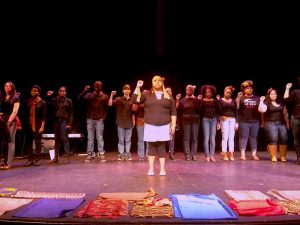An event dedicated to Nelson mandela and music from the South African apartheid era was held by nine organizations on campus at Dodd’s Theater on Thursday, March 6.

The evening was kicked off with the UNH Choir and Life Kingdom Ministries Choir, led by Noel Ginyard, singing the national- and black anthem. Songs about freedom followed and allowed the audience to grasp the relation between music and emotion. Roughly 20 men and women, dressed in traditional clothing, infected the spectators with happiness by accompanying their songs with traditional dancing.Motivational speaker and poet, Ms. Gina Simpson, immersed herself into African drumming while reciting inspirational words. “Close your eyes and open your ears, […] rhythms cause me to embrace my inner peace,” she chanted passionately.
President Steven Kaplan joined the stage and shared, “Tonight is special because we’re showcasing many of UNH’s programs and students that have worked together to commemorate this great man.”
UNH Choir and Life Kingdom Ministries Choir, led by Noel Ginyard is photographed above
A spokesperson who attended on behalf of Mayor of New Haven Toni Harp said, “Mandela shows the story of how one can fight the struggle of pain, anger, and greed for apartheid by song.”
Associate Professor Randall Horton, recipient of numerous awards and a national endowment of the Arts Fellowship in literature, wrote and read a moving poem titled, “A Note From the City I Dream,” as an ode to Mandela. His admiration for the leader was demonstrated clearly, “There’s one thing that’s undeniable, and that’s what he meant to the world,” he said.
The highlight of the evening was the screening of “Amandla! A Celebration Of The Life Of Nelson Mandela” (2002) as directed by Lee Hirsch. The documentary studied the experiences of numerous South Africans who were exiled, lost loved ones and had relations to the leaders of the movement. Along with them, “Mungu’s” – what whites were referred as then, such as police officers and teachers – added value to the documentary with their perspectives of the time.
The four-part documentary brought the viewers on an emotional journey from a time of desperation to a time of celebration throughout the different periods and generations of the Apartheid period. The essence of the film captured Mandela’s spirit by having the subjects discuss their relations and views of the symbol for peace that became their President.
Lee Hirsch was loudly applauded and praised as he made his way to the stage. He was 19 when he started filming, and finished the movie that received a Sundance award a decade later.
“It was the music and this exploration that I wanted to understand; why people are singing, what are they singing. To me the idea that you could have a revolution that’s peaceful, driven by people singing, was so extraordinary and so unique that it sustained this journey for me to make this film.”












